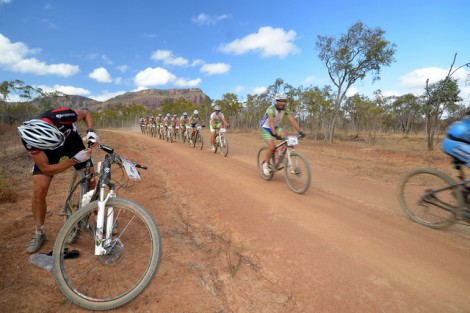Another boomerang for the Czech Republic – Ondrej Fojtik claims his second stage win ahead of Ivan Rybarik (CZE) and Cory Wallace (CAN) after a gruelling stage. In the general classification the two Czech riders still dominate the field, with Rybarik leading ahead of Fojtik and Austrian Wolfgang Krenn was able to increase his gap to fourth Werner van der Merwe (UK) and Ondrej Slezak (CZE) who still is in fifth place. The Australian Kate Major is still leading the women’s classification and Steven Rankine from Mossman near Cairns takes over the Australian leader’s jersey.
Under cloudy skies the sixth stage of the 2012 Crocodile Trophy started with an immediate attack by M1 racer Christof Marien (BEL). The first 60 km of the race were on undulating gravel roads and with the Austro-Australian duo Dominick Hrinkow and Justin Morris trying to chase Marien down, the peloton with most of the leaders jerseys was cruising along. The Rubena Rocky Trail Racing team with Ivan Rybarik, Ondrej Slezak and Michal Kafka was controlling the pace of the main peloton, often called the “Croc train” among racers, leading the group towards the dreaded climb that was going to take them up more than 450 m of elevation across only about 20 km.
“The first 60km were not so difficult”, said the beaming stage winner Fojtik at the finish. We rode in the group and there were some attacks from riders, but we were not worried. However, the second part of the stage caught all of us by surprise – it was considerably more difficult than what the elevation profile in the road book had promised.”
He had noticed that Ivan Rybarik started to suffer already after the first feed zone. “I tried to stay consistent throughout the day and I think Ivan went too hard in the beginning of the race and then wasted valuable energy coming into the first few climbs and his energy was dropping.”
From the mid-stage point after the second feeding zone, Rybarik had taken initiative and attacked the hill furiously. Fojtik didn’t stay far behind, but as they caught the breakaway riders, the entire chasing peloton exploded around them, as today’s third, Cory Wallace (CAN) describes it: “That was the hardest stage this year so far. Long, hot, dry, sandy and steep climbs that wouldn’t end. After the second depot we hit the first big climb and basically, the bunch blew into pieces. I wasn’t feeling so good at the start, but started to bounce back by just riding a consistent pace on the climbs. I tried not to use all my energy and made a mistake to let the two get away after the third depot. They raced off and had a bout a 30 second lead on me – I kept seeing them ahead of me for more than an hour!”
Fojtik added that he was particularly happy to claim today’s stage win Boomerang. “I am really happy about my victory. We saw today that Ivan is not superhuman and that he also suffers on such a tough stage. But to win after almost five hours in that heat and after such a difficult race with all those technical climbs, river crossings and rocky descents, makes me really proud.”
More than half way and getting tired
“I think all riders are a little bit tired and slowly the stages are taking their toll. I think this year is much tougher – the stages seem shorter on paper, but they really challenge your riding skills and endurance”, said today’s fifth, the Austrian Wolfgang Krenn. He had been riding together with M1 race leader Werner van der Merwe (UK) for most of the day, who crossed the finish line only seconds ahead of him. Everyone needed to really dig deep now and look after themselves and their equipment to get through the next three days of racing, Krenn added.
Keeping the Croc train running
Throughout the nine race days, the Croc riders are accompanied by almost 100 staff, including two bike mechanics, two doctors and six physio therapists.
“You do notice that people are starting to fatigue now”, said Dr. Andreas Nemeth today. “The most common injuries we see are bruises, scratches, sore bottoms, but we are also prepared for serious incidents. We are in contact with all major hospitals and ambulance services.” He added that either of them travelled with the lead and finish vehicles and that way they follow the entire race track. “We are on call 24/7, basically. Riders come to us in the morning to get fresh bandages, we look after them during the race and then of course as they come into the camp, where we have set up our tent that functions as a small clinic”, explained the general practitioner and trained paramedic from Austria today.
Head physio therapist Maria Schöffmann said today that sometimes they also had to provide some moral support to riders. “By now riders seem to get really tired and their bodies are suffering. We massage riders and can also do basic osteopathic adjustments, stretching and tape treatments, but sometimes a friendly smile and listening to their day’s adventure makes the feel better after a long stage in the saddle”, she said.
Bike doctors on call
Micha Salden can’t remember how often he has been helping out as a bike mechanic at the Crocodile Trophy anymore, only that sometimes only improvising is what keeps a bike rolling. “I am a bike mechanic by trade and with all those modern bikes these days you really need to know what you are doing”, he said. The most common problems are faults with gear shifting and buckled wheels. His “second-in-command” this year, Niels adds that the stage into Mt Mulligan had been the toughest on equipment so far. “The riders experienced heavy rain in the morning, crossed through knee-deep rivers, rode across mud and sand, that takes it’s toll.”
“I knew that the Australian Outback would be tough and wasn’t too surprised that the climbs today were never-ending”, agreed Kate Major, the Australian who is leading the women’s field after six stages. If she had seen any crocodiles on track yet? “No, and honestly, the only crocodile I want to see is the one that doesn’t move on my trophy in Cooktown”, she grinned.
Tomorrow’s stage seven heads to Maytown on 120 km with 1400m elevation. The former main settlement on the Palmer River goldfields in Far North Queensland is the venue for the best views of a Solar Eclipse in November this year.
Photos: Crocodile Trophy/Regina Stanger

